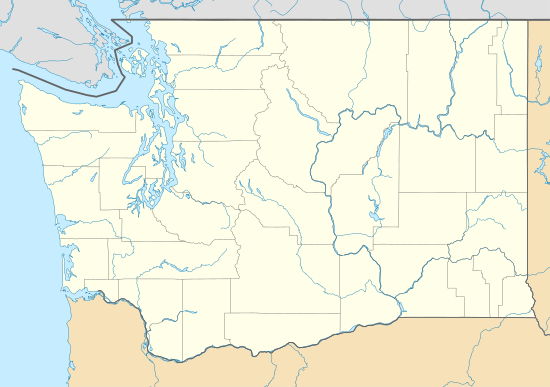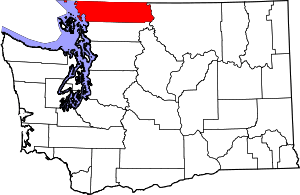Sumas, Washington
Sumas is a city in Whatcom County, Washington, United States. It had a population of 1,307 as of the 2010 census. Sumas is located adjacent to the Canada–U.S. border and borders the city of Abbotsford, British Columbia. The Sumas-Huntingdon port of entry at the north end of State Route 9 operates 24 hours a day. Sumas shares Nooksack Valley School District with the cities of Nooksack and Everson. It is the northernmost settlement on Washington State Route 9.
Sumas, Washington | |
|---|---|
The city's welcome sign, pictured in 2009 | |
 Location of Sumas, Washington | |
 Sumas, Washington Location of Sumas, Washington | |
| Coordinates: 48°59′50″N 122°15′56″W | |
| Country | United States |
| State | Washington |
| County | Whatcom |
| Government | |
| • Mayor[1] | Kyle Christensen |
| Area | |
| • Total | 1.47 sq mi (3.81 km2) |
| • Land | 1.47 sq mi (3.80 km2) |
| • Water | 0.00 sq mi (0.01 km2) |
| Elevation | 43 ft (13 m) |
| Population | |
| • Total | 1,307 |
| • Estimate (2019)[4] | 1,534 |
| • Density | 1,045.67/sq mi (403.64/km2) |
| Time zone | UTC-8 (Pacific (PST)) |
| • Summer (DST) | UTC-7 (PDT) |
| ZIP code | 98295 |
| Area code | 360 |
| FIPS code | 53-68330 |
| GNIS feature ID | 1512699[5] |
| Website | City of Sumas |
History
Sumas was officially incorporated on June 18, 1891. A post office with that name has been in operation since 1897.[6] The community was named after the Sumas First Nation.[7][8]
Geography
Sumas is located at 48°59′50″N 122°15′56″W (48.997278, -122.265522).[9]
According to the United States Census Bureau, the city has a total area of 1.48 square miles (3.83 km2), all of it land.[10]
Due to a surveying error, part of Sumas lies above the 49th parallel and is thus the northernmost incorporated place in the contiguous United States.[11][12]
Demographics
| Historical population | |||
|---|---|---|---|
| Census | Pop. | %± | |
| 1900 | 319 | — | |
| 1910 | 902 | 182.8% | |
| 1920 | 854 | −5.3% | |
| 1930 | 647 | −24.2% | |
| 1940 | 650 | 0.5% | |
| 1950 | 658 | 1.2% | |
| 1960 | 629 | −4.4% | |
| 1970 | 722 | 14.8% | |
| 1980 | 712 | −1.4% | |
| 1990 | 744 | 4.5% | |
| 2000 | 960 | 29.0% | |
| 2010 | 1,307 | 36.1% | |
| Est. 2019 | 1,534 | [4] | 17.4% |
| U.S. Decennial Census[13] | |||
2010 census
At the 2010 census,[3] there were 1,307 people, 482 households and 329 families living in the city. The population density was 883.1 inhabitants per square mile (341.0/km2). There were 531 housing units at an average density of 358.8 per square mile (138.5/km2). The racial makeup of the city was 83.7% White, 1.5% African American, 2.4% Native American, 1.5% Asian, 6.6% from other races, and 4.2% from two or more races. Hispanic or Latino of any race were 15.8% of the population.
There were 482 households of which 39.8% had children under the age of 18 living with them, 49.6% were married couples living together, 11.6% had a female householder with no husband present, 7.1% had a male householder with no wife present, and 31.7% were non-families. 26.3% of all households were made up of individuals and 6.4% had someone living alone who was 65 years of age or older. The average household size was 2.71 and the average family size was 3.27.
The median age in the city was 30.6 years. 28.8% of residents were under the age of 18; 12.1% were between the ages of 18 and 24; 27.2% were from 25 to 44; 21.3% were from 45 to 64; and 10.6% were 65 years of age or older. The gender makeup of the city was 49.2% male and 50.8% female.
2000 census
At the 2000 census, there were 960 people, 346 households and 236 families living in the city. The population density was 687.5 per square mile (264.8/km²). There were 401 housing units at an average density of 287.2 per square mile (110.6/km²). The racial makeup of the city was 86.15% White, 3.23% Native American, 4.17% Asian, 4.79% from other races, and 1.67% from two or more races. Hispanic or Latino of any race were 7.81% of the population.
There were 346 households of which 39.9% had children under the age of 18 living with them, 51.2% were married couples living together, 11.3% had a female householder with no husband present, and 31.8% were non-families. 26.6% of all households were made up of individuals and 9.2% had someone living alone who was 65 years of age or older. The average household size was 2.77 and the average family size was 3.42.
35.0% of the population were under the age of 18, 8.2% from 18 to 24, 29.0% from 25 to 44, 17.6% from 45 to 64, and 10.2% who were 65 years of age or older. The median age was 31 years. For every 100 females, there were 97.9 males. For every 100 females age 18 and over, there were 100.0 males.
The median household income was $29,297 and the median family income was $36,250. Males had a median income of $30,227 compared with $20,268 for females. The per capita income for the city was $13,497. About 13.9% of families and 18.0% of the population were below the poverty line, including 23.1% of those under age 18 and 14.9% of those age 65 or over.
Municipal services
The City of Sumas provides electricity to residents and businesses purchased from the Bonneville Power Administration, as well as offering water, sewer, and analog cable service including a mix of major Seattle networks, Canadian broadcast TV, expanded cable channels, and Showtime.[14]
References
- "Bob Bromley". Libertarian Party. Retrieved 2014-09-09.
- "2019 U.S. Gazetteer Files". United States Census Bureau. Retrieved August 7, 2020.
- "U.S. Census website". United States Census Bureau. Retrieved 2012-12-19.
- "Population and Housing Unit Estimates". United States Census Bureau. May 24, 2020. Retrieved May 27, 2020.
- "US Board on Geographic Names". United States Geological Survey. 2007-10-25. Retrieved 2008-01-31.
- "Post Offices". Jim Forte Postal History. Retrieved 25 August 2016.
- Meany, Edmond S. (1923). Origin of Washington geographic names. Seattle: University of Washington Press. p. 296.
- "Cities and Towns, State of Washington Dates of Incorporation, Disincorporation, and Changes of Classification". Municipal Research and Services Center. Archived from the original on November 26, 2013. Retrieved February 25, 2013.
- "US Gazetteer files: 2010, 2000, and 1990". United States Census Bureau. 2011-02-12. Retrieved 2011-04-23.
- "US Gazetteer files 2010". United States Census Bureau. Archived from the original on 2012-01-25. Retrieved 2012-12-19.
- Judd, Ron (February 13, 2015). "Canada, Seattle's neighbor to the north? Nope, better check your map". The Seattle Times. Retrieved June 21, 2017.
- Hopper, Tristin (February 26, 2017). "The town that should be Canadian: How a surveying error put Sumas, Washington on B.C. soil". National Post. Retrieved June 21, 2017.
- United States Census Bureau. "Census of Population and Housing". Retrieved July 21, 2014.
- "Utility Rates and Fees". City Of Sumas. 29 February 2016. Retrieved 20 April 2016.
External links

- City website
